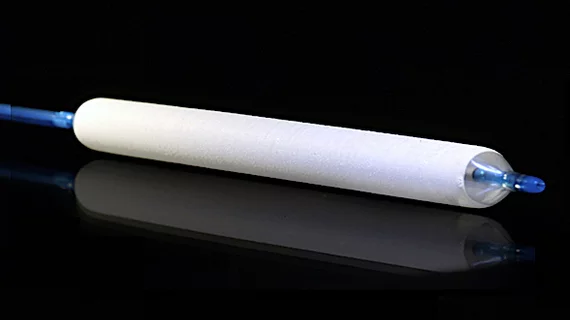FDA approves next-gen DCB, earning the manufacturer a $27M payment from Abbott
Surmodics, a Minnesota-based healthcare technology company, has received U.S. Food and Drug Administration (FDA) approval for its SurVeil drug-coated balloon (DCB).
The newly approved device was designed for percutaneous transluminal angioplasty of de novo or restenotic lesions in femoral and popliteal arteries with reference vessel diameters of 4 to 7 mm. According to Surmodics, the company developed a proprietary formula to ensure the coating was durable. Also, the next-generation device was manufactured in a way that emphasizes coating uniformity.
“Obtaining FDA approval for our SurVeil DCB is one of the most important achievements in Surmodics’ history,” Gary Maharaj, president and CEO of Surmodics, said in a prepared statement. “It represents a major milestone in our efforts to develop next-generation products to help millions of people affected by peripheral artery disease (PAD) and the physicians that treat them. I would like to thank our internal SurVeil DCB team and our external advisors, investigators and partners for their multi-year efforts to make this achievement possible.”
Surmodics receiving a $27M milestone payment from Abbott
Abbott has exclusive commercialization rights for the SurVeil DCB, but Surmodics will still manufacture and supply the device, earning revenue from any sales made by Abbott. As part of the working agreement between these two companies, Surmodics will receive a milestone payment from Abbott worth $27 million as a result of receiving FDA approval. According to Surmodics, this should result in anywhere from $24 to $24.5 million in revenue.
“Building on our recent progress, Surmodics remains focused on supporting Abbott and its exclusive worldwide commercialization rights for the SurVeil DCB,” Maharaj said.
The TRANSCEND trial
Data from the TRANSCEND clinical trial played a key role in the SurVeil DCB gaining FDA approval. The trial included 446 participants with symptomatic PAD due to stenoses in their femoral or popliteal arteries.
Overall, the TRANSCEND trial showed that, after 24 months, the SurVeil DCB was associated with safety outcomes and a primary patency rate comparable to similar devices with a much higher drug load.

